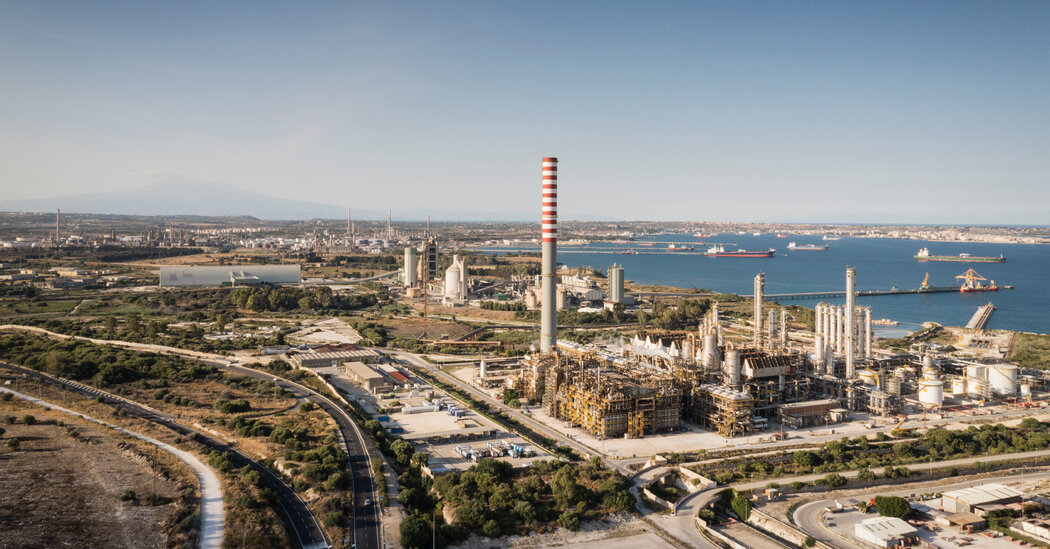
Like thousands of Sicilians who live near Priolo Gargallo, part of an industrial petrochemical hub on this island’s southeastern coast, Davide Mauro has tied his livelihood to the giant Russian-owned Lukoil refinery — a landscape of towering chimney stacks, steel cranes and flat-topped gas tanks that rise above the Ionian Sea’s brilliant turquoise waters.
Ever since the European Union agreed to ban most imports of crude oil from Russia because of its invasion of Ukraine, the future of this refinery — the largest in Italy — has been thrown into doubt. The deadline for the embargo is less than three months away, but workers still have no idea whether they will have jobs once it goes into effect on Dec. 5.
“The company never says anything official,” said Mr. Mauro, a shift operator who has worked for 20 years at a plant that supplies the oil refinery with power. There has been talk of the Italian government’s possibly nationalizing the facility or guaranteeing new lines of credit. Most recently, there has been talk of an interested American buyer. But Mr. Mauro said: “It’s all rumors. Nothing’s clear.”
The uncertainty hanging over the Lukoil refinery is a potent example of how the hard-won unified opposition to Russia’s invasion of Ukraine is rippling, sometimes in unintended ways, through Europe, straining local economies and fanning political tensions.
Soaring fuel and food prices have eroded living standards. European leaders have already warned that rationing, factory closures and blackouts may be coming this winter. But in places like the Siracusa province of Sicily, the economic sanctions against Russia — previously Europe’s largest supplier of energy — carry a particular sting.
Areas bearing a disproportionate share of the economic burden can be found all over the continent: in Schwedt, Germany, where an oil refinery also depends on Russian crude; in Arques, France, where an energy-hungry glass factory can’t afford to keep the furnaces running; and in Tertre, Belgium, where high natural gas prices have compelled the fertilizer company Yara to shutter its operation.
If the Lukoil site in Priolo closes, Mr. Mauro said, he will probably have to leave this place, where he was born. The unemployment rate in Sicily is nearly 19 percent — one of the highest in the European Union. Finding a well-paying job like the one Mr. Mauro has with Lukoil would be next to impossible.
“It’s a nightmare,” he said. “My entire life is here.”
Lukoil, the largest private corporation in Russia, was not singled out by sanctions by any country when the Ukraine war started in February. Still, many banks and other financial institutions decided to avoid doing business with Russian companies after the European Union imposed sanctions. And so Lukoil lost lines of credit, which it had used to finance purchases of crude from suppliers outside Russia.
Before the war, the Priolo refinery, known as ISAB after its former owner, got roughly 40 to 50 percent of its oil from Russia. Now with those other sources off limits, its only alternative was to get all of its crude from Lukoil.
But when the European Union’s oil embargo kicks in, no Russian oil will be allowed in. Without a financial rescue plan that would allow it to buy non-Russian oil, the plant faces closure and job cuts.
“The impact on the community will be devastating,” Giuseppe Gianni, the mayor of Priolo, said from his office, lighting a small cigar. Above his desk hung a gold crucifix and an enormous painting of a Madonna and Child under a fig tree. Outside the window is a small pastel-colored playground with a view of the refinery as a backdrop.
Mr. Gianni acknowledged that the petrochemical complex had been linked to toxic air, water pollution and cancer, which he said needed to be resolved, but he maintained that closing the refinery would blight the area’s economy.
The refinery, which processes more than a fifth of Italy’s crude oil in addition to exports to other countries, employs about 1,000 workers directly. Two thousand more are contractors working on maintenance and mechanical projects. Another 7,500 in the area — from truck drivers to seamen — would be affected by the widespread layoffs.
“The effect would be destabilizing for the whole industrial area,” said Carmelo Rapisarda, the head of the industrial sector of the C.G.I.L. trade union in Siracusa, adding that the 35-kilometer industrial hub accounts for half the province’s economy.
The looming oil embargo has forced the region to suddenly confront a long-simmering crisis. The European Union’s decision to transition away from fossil fuels to renewable energy sources means that the life span of the ISAB refinery and two others on Sicily’s coast is limited.
“The situation was already critical regardless of the war,” Mr. Rapisarda said.
Last year, Confindustria Siracusa, the area’s industrial association, proposed a $3 billion conversion plan to develop new clean facilities that could reduce carbon emissions and produce hydrogen. But both the Italian government and the European Union have been reluctant to spend money to help the oil industry transition.
Aside from the economic fallout on the region, the refinery is important to Italy’s energy security, said Simone Tagliapietra, a senior fellow at Bruegel, a research group in Brussels. “They cannot let the refinery close down” right away, he said. It is needed “to ensure the provision of oil products, mainly to southern Italy” during the transition.
The political situation is complicating the search for a quick solution. Mario Draghi’s national unity government fell in July, and he is in a caretaker role until elections on Sunday. Giorgia Meloni, the hard-right leader of Brothers of Italy, is leading in the polls.
Once a vocal admirer of President Vladimir V. Putin of Russia, Ms. Meloni has recently said she supports following the European Union sanctions and sending weapons to Ukraine.
Whoever wins the election will inherit the fallout from the oil embargo. But in the meantime, the situation is becoming urgent. To meet the Dec. 5 deadline of ending seaborne imports, the plant would have to start preparing for a shutdown in November and halt deliveries. Various figures, including the outgoing ecological minister, have mentioned the possibility of nationalizing the refinery. In Germany, the government last week took control of three refineries owned by the Russian oil company Rosneft.
But Claudio Geraci, vice president of Confindustria Siracusa, dismissed the idea of nationalization as absurd. Mr. Geraci, who is deputy general manager for human resources and external relations at ISAB in Sicily, emphasized that he was speaking solely in his capacity as vice president of the industrial association. “As ISAB’s manager, there is no comment,” he said. In response to queries, press representatives at Lukoil’s headquarters in Moscow declined to comment.
Mr. Geraci said “the only possibility” was for the government to guarantee a line of credit so that the company could buy crude from non-Russian sources. But he added that “from Confindustria’s point of view, the situation is difficult,” because the Italian government does not want to be seen as helping a Russian company.
Local political leaders said there had been interest from potential outside investors. According to union officials, representatives from Crossbridge Energy Partners, a New York-based company that converts traditional energy infrastructure, had recently visited the plant. Crossbridge said it had no comment.
Any meaningful and sustainable conversion plan would need significant public investment, said Lucrezia Reichlin, the founder and president of the Ortygia Foundation, a nonprofit devoted to promoting development in southern Italy and located about five miles south of Priolo.
Given the region’s important industrial tradition, such an approach makes sense, Ms. Reichlin said. But with the political uncertainty, she added, “I doubt that we’ll have a government that is ambitious enough to look at this situation with a long-term view toward the energy transition.”
Ms. Reichlin, who is also an economics professor at the London Business School, said the Italian government was likely to fall back on a familiar and expensive stopgap measure: public assistance for employees who lose their jobs.
For now, it seems that workers like Mr. Mauro, politicians like Mayor Gianni and industrial leaders like Mr. Geraci are operating on a wing and a prayer, inveighing against the inaction, while hoping for a last-minute miracle.
“It’s like the bank that is too big to fail,” Mr. Mauro said of the refinery and his hope for a bailout. But the precise solution is still murky. “It’s a typical Italian situation,” he added. “I’m sure we will know what happens only at the last moment.”




